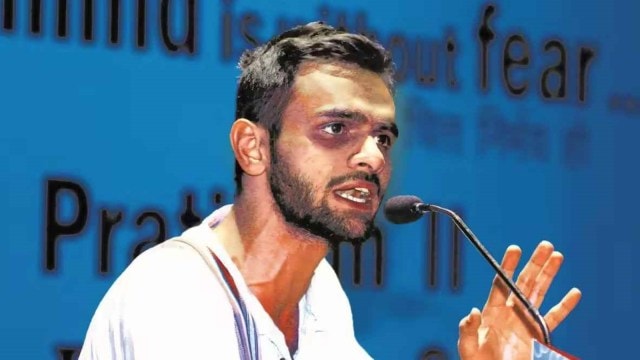Umar Khalid ‘veteran of sedition’, anti-CAA protesters wanted regime change like in Nepal, Bangladesh: Delhi Police to SC on 2020 riots
The court is hearing appeals filed by Umar Khalid, Sharjeel Imam, Gulfisha Fatima, Meeran Haider, Shifa Ur Rehman, Mohd Saleem Khan, and Shadab Ahmad, challenging the Delhi High Court order denying them bail in the case of larger conspiracy behind the riots.
 Opposing their prayer for bail on the ground of undue delay in trial, Raju said the accused were responsible for the delay and cannot be given the benefit of the same. He added, “I can finish the trial in two years if they cooperate.”
Opposing their prayer for bail on the ground of undue delay in trial, Raju said the accused were responsible for the delay and cannot be given the benefit of the same. He added, “I can finish the trial in two years if they cooperate.”
Calling 2020 riots accused Umar Khalid a “veteran of sedition”, the Delhi Police on Friday told the Supreme Court that the protests were not just a “simple dharna for (opposing the) Citizenship Amendment Act, it was for regime change…like in Nepal and Bangladesh.”
“This is a clear case where offences under Unlawful Activities Prevention Act (UAPA), 1967, are attracted. A conspiracy to commit terrorist acts and murder is made out. And it was not simple dharna for CAA, it was for regime change. All those who went for dharna carried sticks, acid bottles, and (it) coincided with Donald Trump’s visit — they wanted regime change like in Bangladesh and Nepal. They have scant regards to the constitution,” Additional Solicitor General (ASG) S V Raju, appearing for the Delhi Police, told a bench of Justice Aravind Kumar and N V Anjaria.
The court is hearing appeals filed by Umar Khalid, Sharjeel Imam, Gulfisha Fatima, Meeran Haider, Shifa Ur Rehman, Mohd Saleem Khan, and Shadab Ahmad, challenging the Delhi High Court order denying them bail in the case of larger conspiracy behind the riots.
Opposing their prayer for bail on the ground of undue delay in trial, Raju said the accused were responsible for the delay and cannot be given the benefit of the same. He added, “I can finish the trial in two years if they cooperate.”
Highlighting the violence in the wake of the riots, the ASG referred to Sharjeel Imam’s alleged speeches on severing the Chicken’s Neck area in Assam connecting the rest of India to Northeast and calls by some of the accused for disrupting economic supplies, and said that they attract the offence of ‘terrorism’ under Section 15 of the UAPA.
The ASG pointed out that Umar Khalid had a case earlier too for his speech wherein he allegedly said “Bharat tere tukde-tukde hoge”. Khalid, he said, is a “veteran of sedition” and had formed WhatsApp groups only with Muslim students for riots, the ASG said. “The intention was to cause havoc…”, he added.
Raju said that on February 23, 2020, riots took place in North East Delhi but the conspirators still did not get their desired scale of violence as no murder could take place. So, the Delhi Protest Support Group (DPSG) – allegedly formed by the conspirators) members Athar and Shadab – again called a “conspiratorial: meeting in the night at Mukhtyar’s house in Chand Bagh.
“Absconding accused Suleman Siddiqui and one Ayub were also present. Therein, Athar informed that Nadeem bhai (a DPSG member) is annoyed as he is not getting the desired scale of violence in riots due to CCTVs,” the ASG said, adding that “this was revealed by a protected witness.”
“The second step was to remove the CCTV cameras. Once CCTVs were damaged and destroyed, by 12:50 PM, large-scale mobilisation and subsequent violence was orchestrated in North-East Delhi as per conspiracy. Rioters attacked police in a planned manner at 1 PM. Head Constable Ratan Lal was killed in this attack at Chand Bagh and two IPS officers…were injured in a brutal manner inflicting life threatening injuries. One IB official Ankit Sharma was also killed. Rioters attacked police personnel with fire-arms, sharp edged weapons including swords, acid, stones etc. Sling-shots, fixed at roof earlier, were also used to throw acid bottles over the police personnel to get maximum casualties,” the ASG told the court.
Raju told the bench that five accused — Tahir Hussain, Ishrat Jahan, Khalid Saifi, Shifa-Ur-Rehman and Meeran Haider — had allegedly financed the riots. Tahir Hussain provided Rs 1.3 crore and Shifa-Ur-Rehman Rs. 8.90 lakh, he submitted, adding that the Enforcement Directorate is probing the money trail.
The hearing will now resume on November 24.







